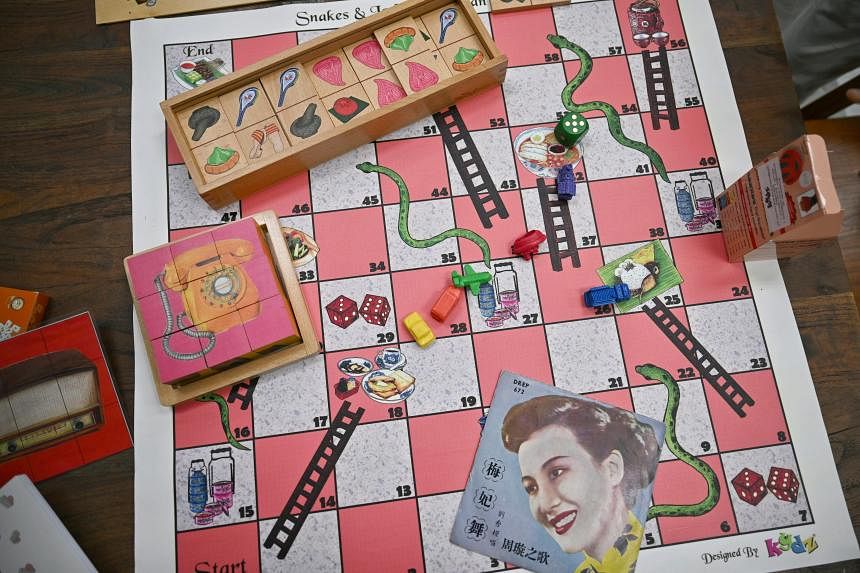This growing silver industry in the Republic’s ageing society, which has strong echoes of childhood, banks on a heavy dose of nostalgia and heritage. SINGAPORE – The demand is rising for senior-friendly toys and games in Singapore, with some aimed at engaging persons with dementia. This growing silver industry in the Republic’s ageing society, which has strong echoes of childhood, banks on a heavy dose of nostalgia and heritage.
Think jigsaw puzzles with traditional trishaws and kacang puteh sellers; word search puzzles with Singlish terms; or dominoes with images of ang ku kueh confections. Memory games, building blocks, fidget spinners and dolls also figure. Ms Carrie Chan, 59, co-founder of toy business KYDZ International, located in Bukit Merah, says that sales of senior-friendly games and toys, many of which she designed herself, have increased.

Ten years ago, such products constituted 20 per cent of her total sales. This figure is now about 40 per cent, she says, declining to provide exact numbers. She started designing senior-friendly games when the staff of a geriatric ward at a local hospital approached her to customise toys to reflect Singaporean culture.
“They wanted the images to be respectful of the elderly, and not cartoonish like Mickey Mouse. A lot of imported games and puzzles then showed wintry Christmas scenes or pictures of Thanksgiving, which local seniors could not identify with,” she recalls. Ms Carrie Chan, 59, co-founder of toy business KYDZ International, located in Bukit Merah, says that sales of senior-friendly games and toys, many of which she designed herself, have increased.
ST PHOTO: ARIFFIN JAMAR Ms Chan, who used to own a pre-school, has designed puzzles, games, and activity and colouring books which carry images of traditional Singapore. These visuals include hawkers, the National Theatre, old-school telephones with circular dials, rainbow kueh lapis desserts and even the late Chinese movie actress Li Li-hua, who made her debut in 1940. Ms Chan’s word search puzzles include those with words such as “kiasi” (Hokkien for afraid to die) and hong deng ma tou (the traditional Chinese name for Clifford Pier), as well as Tamil and Malay phrases.
She anticipates more demand for senior-friendly toys and is working on game apps for this demographic that can be played on mobile phones and tablets. Over in Ubi, The Golden Concepts, which sells mobility aids, eldercare equipment and other products that enable ageing well, has seen an increase in sales of about 40 per cent from 2023, for its activity sets for seniors with dementia. These products include board games, jigsaw puzzles and colouring kits that use water to reveal paint colours.
The Golden Concepts co-founder Lee Chang Xi, 36, notes that this demand is driven by adult children who are caregivers to their parents, grandparents and other older relatives with dementia, as well as by nursing homes, senior activity centres and community hospitals looking to provide a wider range of activities for their clients. She says: “There’s been a lot more awareness about dementia and a lot more proactivity on the part of caregivers, usually the adult children, who want to help their family members and keep them engaged.” Some of these products provide prompts to facilitate conversation, such as a game that encourages seniors to reflect on their 30s, 40s and beyond through guided questions.
“Most people want to include their family members in conversation, but sometimes don’t know what to talk about,” says Ms Lee. The Golden Concepts co-founder Lee Chang Xi, 36, notes that this demand is driven by adult children who are caregivers to their parents, grandparents and other older relatives with dementia. ST PHOTO: ARIFFIN JAMAR ‘I gave them a star’ One business owner says that eldercare facilities have been snapping up her sensory activity sets which are meant for children with special needs, such as autism and attention deficit hyperactivity disorder.
Ms Linda Ong, 64, founder of Rysel Toys, started out selling toys and games for children with special needs. These sets include sensory boards, fidget tools, balancing and stacking games, and building blocks. Several years ago, she was approached by eldercare organisations which wanted to purchase these products.
“Sometimes, they would want products with bigger fonts, so it’s easier for seniors to look at. There have been more inquiries as well as a 50 per cent rise in sales in the past five years,” she says. “We’re an ageing population and more eldercare homes are coming up.
There’s a shift from early intervention centres to having more senior day centres approaching me.” Ms Chan from KYDZ International has occasionally encountered seniors at eldercare facilities who benefit from her activity books in other ways. She has designed books with tropes similar to children’s activity books, which involve tracing, dot-to-dot activities, spot-the-differences pictures, number puzzles and word searches.
Once, a senior told her she was too poor to attend school and used an activity book of hers to “study”. Ms Chan recalls: “Some of them called me teacher and wanted me to mark the book for them. I gave them a star.
” Dr Chris Tsoi Tung, senior consultant psychiatrist at the department of psychological medicine at the National University of Singapore’s Yong Loo Lin School of Medicine, observes that there are “overlapping needs” served by games designed for children with special needs and those for seniors with declining physical or cognitive abilities. Stacking toys, for instance, may benefit elderly persons who need to improve their dexterity after a stroke. “Such games or toys typically suit people at the moderate or later stages of dementia, where they are finding more difficulty expressing themselves and losing awareness of their surroundings.
These activities may help them remain engaged,” says Dr Tsoi. Ms Linda Ong, 64, founder of Rysel Toys, says eldercare organisations started approaching her several years ago to buy her toys and games meant for children with special needs. ST PHOTO: VENESSA LEE Fringe benefits Associate Professor Helen Ko at the S R Nathan School of Human Development at the Singapore University of Social Sciences, who specialises in gerontology, lists other benefits of senior-friendly toys.
Sensory toys, including fidget toys for persons with dementia, can reduce restlessness and agitation; comfort items like dolls can stimulate memories and promote calmness; while interactive games can enhance cognitive functions and allow participants to practise their hand-eye coordination and fine motor skills, such as when they roll dice, shuffle cards or assemble game pieces on a board, says Dr Ko. Besides, games played in a group promote social engagement. But it is important to consider the suitability of such activities “in alignment with a senior’s cognitive levels and other health conditions”, she adds.
Including meaningful signifiers of Singaporean culture, or items and landmarks they grew up with, in the games or kits can also provide comfort and solace to seniors. Dr Ko says: “The value of nostalgia and heritage in activities and toys for seniors with or without dementia is that they offer a sense of security and familiarity. These can help trigger positive emotions and memories that affirm seniors’ lived experiences.
Reminiscence is generally therapeutic for most people.” Dr Tsoi says there is value in trying to evoke the long-term memory of persons living with dementia. “Engaging in reminiscence may give them joy and help them connect with others and express themselves, despite their declining short-term memory.
” Keeping dementia at bay Some Singaporeans have started playing these old-school games in a bid to stave off dementia. Mrs Sharon Kwek, 73, started playing puzzles and games like Snakes And Ladders – with images such as kaya toast, old Singer sewing machines and decorative tiffin carriers – with her father and mother-in-law in recent years, before they died in their 90s. Mrs Sharon Kwek used old-school puzzles and games like Snakes And Ladders to engage her father and mother-in-law.
ST PHOTO: ARIFFIN JAMAR “Seeing the old folks enjoy playing games, I felt I should share this experience, and bought some for myself. It’s mainly to keep my mind and my husband’s mind active,” says the retired financial professional who is married to a retired engineer in his 70s. They have a son and a daughter in their 30s.
Mrs Kwek has always been enthusiastic about games, playing card games such as Happy Families with her children when they were young, like she did in her childhood. She also used to play Uno and Scrabble with her colleagues during lunch breaks when they ate in the office. “Right now, the significance is different from when I played such games as a younger adult.
At this age, I feel I should do my best to keep dementia at bay,” says Mrs Kwek, after witnessing her dementia-stricken mother-in-law’s “frightening” decline over the years. Spending time playing games or colouring with her mother-in-law in the last years of her life provided relaxing interludes for both of them, even though the older woman could not speak by then. Her mother-in-law would occasionally smile when she was colouring certain items like a picture of a pestle and mortar, perhaps recalling how she had used it before, says Mrs Kwek.
“I missed that beautiful mother-daughter-in-law relationship,” says Mrs Kwek. “With dementia, she couldn’t remember my name. There was no more communication except for the games.
” Join ST's Telegram channel and get the latest breaking news delivered to you. Read 3 articles and stand to win rewards Spin the wheel now.



















